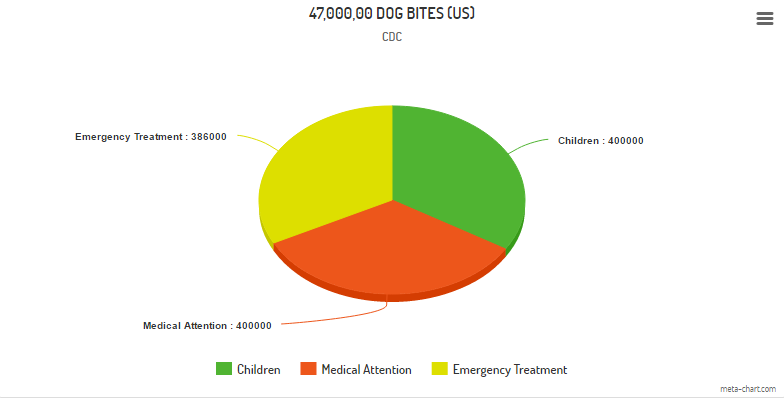Top 10 Risks For Dog Bites and How To Protect Yourself
Dogs have forever been our loyal companions and best friends. But sometimes that trust can be broken and literally it can bite you in the butt.
DON’T BECOME A STATISTIC!
The CDC has reported that more than 4.7 million dog-bite incidents occur in the United States every year. Of those 4.7 million attacks, 800,000 of those bitten will seek medical attention — half of which are children — and 386,000 will need emergency medical treatment.
As frightening as these statistics are, you can reduce your chances of being bit when you know the risks. From the top breeds that bite, to knowing what states have the most dog bite incidents, to understanding the likelihood of being bitten, we are giving you the information you need to avoid being a statistic.

WHAT ARE THE RISKS?
Every breed carries a risk that they will bite. It is part of their DNA. But some dogs are more likely to bite more than others if they are not trained properly or mistreated. Here are the top 5 breeds that are likely to bite.
- Chihuahua : That’s right! Their bite can be as bad as their bark. Chihuahuas are fierce biters, especially when they are frightened. They have small sharp teeth that can tear through skin.
- Bulldog : Bulldogs are generally kind but have a tendency to become snappy if not properly trained. They are very impressionable dogs and they will react if they feel they are threatened.
- Chow Chow : This breed has an aggressive personality, especially with strangers and other pets. The Chow Chow has been responsible for severe biting injures.
- Malamute : This breed was responsible for a very high number of biting incidents and is another case of a large dogs causing harm. Any Families with children need to be careful if purchasing a Malamute.
- Pit Bull : This is considered the most dangerous of dogs. In dog biting studies the Pit Bull stood far ahead of all the other breeds with the majority of reported dog bites attributed to it.
WHERE ARE THE RISKS?
Does where you live increase your risk in being bitten? Here are the top 5 states with the most bites!
- California
- Number of dog-bite claims in 2014: 1,867
- Average cost per claim: $33,649
- Total paid out: $62.8 million
- Ohio
- Number of dog-bite claims in 2014: 1,009
- Average cost per claim: $21,983
- Total paid out: $22.2 million
- New York
- Number of dog-bite claims in 2014: 910
- Average cost per claim: $56,628
- Total paid out: $51.5 million
- Illinois
- Number of dog-bite claims in 2014: 872
- Average cost per claim: $34,894
- Total paid out: $30.4 million
- Pennsylvania
- Number of dog-bite claims in 2014: 861
- Average cost per claim: $26,211
- Total paid out: $22.6 million
*Sources: Insurance Information Institute, State Farm
A FEW EXTRA RISK FACTORS?
Here are a few extra risk factors to think about. No one ever want to be bitten by man’s best friend but you should know all the information to lower your risk.
- Biters are 6.2 times more likely to be male.
- Biters are 2.6 times more likely to NOT be neutered.
- Biters are 2.8 times more likely to be chained down.
HOW DO I PROTECT MYSELF IF I DO GET BIT?
Protecting yourself after being bitten by mans’ best friend is very important. Here are some suggestions to protect yourself.
- Write down the names and addresses of witnesses, the owner of the dog, and anyone who has custody of the dog when it bit you.
- Take a photograph of the bite.
- See a doctor to document and receive treatment.
- Make a report with your local animal control agency and cooperate with the officers investigating the case.
With all this information at your fingertips you still run the risk of being bitten by a dog in your lifetime. There are hundreds of official dog breeds and even more mixes and mutts than you can shake a stick at. Each dog has his own unique set of characteristics and personality. But one thing is for sure – these loyal and wonderful companions can and do bite if you are not careful.
If you’ve been injured in the last two years, you may be entitled to compensation! Click here to see if You Qualify For Compensation



